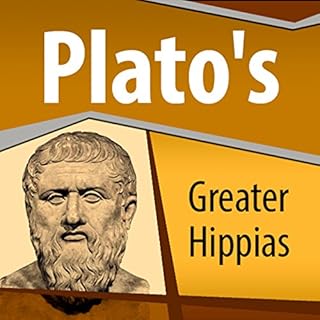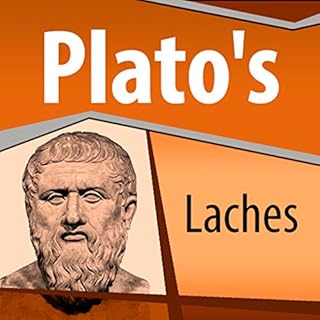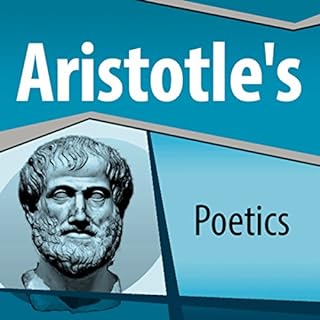
Plato's Symposium
カートのアイテムが多すぎます
カートに追加できませんでした。
ウィッシュリストに追加できませんでした。
ほしい物リストの削除に失敗しました。
ポッドキャストのフォローに失敗しました
ポッドキャストのフォロー解除に失敗しました
Audible会員プラン 無料体験
-
ナレーター:
-
Ray Childs
-
著者:
-
Plato
このコンテンツについて
The dramatic nature of Plato's dialogues is delightfully evident in Symposium. The marriage between character and thought bursts forth as the guests gather at Agathon's house to celebrate the success of his first tragedy. With wit and insight, they all present their ideas about love - from Erixymachus' scientific naturalism to Aristophanes' comic fantasy. The unexpected arrival of Alcibiades breaks the spell cast by Diotima's ethereal climb up the staircase of love to beauty itself. Ecstasy and intoxication clash as Plato concludes with one of his most skillful displays of dialectic.
© Agora Publications
Public Domain (P)2015 Agora, New Internet Technologiesこちらもおすすめ
-
Plato's Phaedo
- 著者: Plato
- ナレーター: Ray Childs
- 再生時間: 2 時間 39 分
- 完全版
-
総合評価0 out of 5 stars 0
-
ナレーション0 out of 5 stars 0
-
ストーリー0 out of 5 stars 0
Socrates is in prison, sentenced to die when the sun sets. In this final conversation, he asks what will become of him once he drinks the poison prescribed for his execution. Socrates and his friends examine several arguments designed to prove that the soul is immortal. This quest leads him to the broader topic of the nature of mind and its connection not only to human existence but also to the cosmos itself. What could be a better way to pass the time between now and the sunset?
著者: Plato
-
Plato's Republic
- 著者: Plato
- ナレーター: Ray Childs
- 再生時間: 11 時間 46 分
- 完全版
-
総合評価5 out of 5 stars 1
-
ナレーション5 out of 5 stars 1
-
ストーリー5 out of 5 stars 1
The Republic poses questions that endure: What is justice? What form of community fosters the best possible life for human beings? What is the nature and destiny of the soul? What form of education provides the best leaders for a good republic? What are the various forms of poetry and the other arts, and which ones should be fostered and which ones should be discouraged? How does knowing differ from believing?
著者: Plato
-
Plato's Gorgias
- 著者: Plato
- ナレーター: Ray Childs
- 再生時間: 3 時間
- 完全版
-
総合評価4 out of 5 stars 1
-
ナレーション4 out of 5 stars 1
-
ストーリー4 out of 5 stars 1
Gorgias of Leontini, a famous teacher of rhetoric, has come to Athens to recruit students, promising to teach them how to become leaders in politics and business. A group has gathered at Callicles' house to hear Gorgias demonstrate the power of his art. This dialogue blends comic and serious discussion of the best life, providing a penetrating examination of ethics.
著者: Plato
-
Plato's Greater Hippias
- 著者: Plato
- ナレーター: Ray Childs
- 再生時間: 1 時間 8 分
- 完全版
-
総合評価0 out of 5 stars 0
-
ナレーション0 out of 5 stars 0
-
ストーリー0 out of 5 stars 0
Hippias of Elis travels throughout the Greek world practicing and teaching the art of making beautiful speeches. On a rare visit to Athens, he meets Socrates, who questions him about the nature of his art. Socrates is especially curious about how Hippias would define beauty. They agree that beauty makes all beautiful things beautiful, but when Socrates presses him to say precisely what he means, Hippias is unable to deliver such a definition.
著者: Plato
-
Plato's Euthyphro
- 著者: Plato
- ナレーター: Ray Childs
- 再生時間: 33 分
- 完全版
-
総合評価0 out of 5 stars 0
-
ナレーション0 out of 5 stars 0
-
ストーリー0 out of 5 stars 0
In Euthyphro, Socrates is on his way to the court, where he must defend himself against serious charges brought by religious and political authorities. On the way he meets Euthyphro, an expert on religious matters who has come to prosecute his own father. Socrates questions Euthyphro's claim that religion serves as the basis for ethics. Euthyphro is not able to provide satisfactory answers to Socrates' questions, but their dialogue leaves us with the challenge of making a reasonable connection between ethics and religion.
著者: Plato
-
Plato's Laches
- 著者: Plato
- ナレーター: Ray Childs
- 再生時間: 59 分
- 完全版
-
総合評価0 out of 5 stars 0
-
ナレーション0 out of 5 stars 0
-
ストーリー0 out of 5 stars 0
Laches, a general in the Athenian army, saw Socrates fight bravely in the battle of Delium. When he and Nicias, another general, are asked to explain the idea of courage, they are at a loss, and words fail them. How does courage differ from thoughtless and reckless audacity? Can a lion be said to be courageous? What about small children who have little idea of the dangers they face? Should we call people courageous who do not know whether their bravery will produce good or bad consequences?
著者: Plato
-
Plato's Phaedo
- 著者: Plato
- ナレーター: Ray Childs
- 再生時間: 2 時間 39 分
- 完全版
-
総合評価0 out of 5 stars 0
-
ナレーション0 out of 5 stars 0
-
ストーリー0 out of 5 stars 0
Socrates is in prison, sentenced to die when the sun sets. In this final conversation, he asks what will become of him once he drinks the poison prescribed for his execution. Socrates and his friends examine several arguments designed to prove that the soul is immortal. This quest leads him to the broader topic of the nature of mind and its connection not only to human existence but also to the cosmos itself. What could be a better way to pass the time between now and the sunset?
著者: Plato
-
Plato's Republic
- 著者: Plato
- ナレーター: Ray Childs
- 再生時間: 11 時間 46 分
- 完全版
-
総合評価5 out of 5 stars 1
-
ナレーション5 out of 5 stars 1
-
ストーリー5 out of 5 stars 1
The Republic poses questions that endure: What is justice? What form of community fosters the best possible life for human beings? What is the nature and destiny of the soul? What form of education provides the best leaders for a good republic? What are the various forms of poetry and the other arts, and which ones should be fostered and which ones should be discouraged? How does knowing differ from believing?
著者: Plato
-
Plato's Gorgias
- 著者: Plato
- ナレーター: Ray Childs
- 再生時間: 3 時間
- 完全版
-
総合評価4 out of 5 stars 1
-
ナレーション4 out of 5 stars 1
-
ストーリー4 out of 5 stars 1
Gorgias of Leontini, a famous teacher of rhetoric, has come to Athens to recruit students, promising to teach them how to become leaders in politics and business. A group has gathered at Callicles' house to hear Gorgias demonstrate the power of his art. This dialogue blends comic and serious discussion of the best life, providing a penetrating examination of ethics.
著者: Plato
-
Plato's Greater Hippias
- 著者: Plato
- ナレーター: Ray Childs
- 再生時間: 1 時間 8 分
- 完全版
-
総合評価0 out of 5 stars 0
-
ナレーション0 out of 5 stars 0
-
ストーリー0 out of 5 stars 0
Hippias of Elis travels throughout the Greek world practicing and teaching the art of making beautiful speeches. On a rare visit to Athens, he meets Socrates, who questions him about the nature of his art. Socrates is especially curious about how Hippias would define beauty. They agree that beauty makes all beautiful things beautiful, but when Socrates presses him to say precisely what he means, Hippias is unable to deliver such a definition.
著者: Plato
-
Plato's Euthyphro
- 著者: Plato
- ナレーター: Ray Childs
- 再生時間: 33 分
- 完全版
-
総合評価0 out of 5 stars 0
-
ナレーション0 out of 5 stars 0
-
ストーリー0 out of 5 stars 0
In Euthyphro, Socrates is on his way to the court, where he must defend himself against serious charges brought by religious and political authorities. On the way he meets Euthyphro, an expert on religious matters who has come to prosecute his own father. Socrates questions Euthyphro's claim that religion serves as the basis for ethics. Euthyphro is not able to provide satisfactory answers to Socrates' questions, but their dialogue leaves us with the challenge of making a reasonable connection between ethics and religion.
著者: Plato
-
Plato's Laches
- 著者: Plato
- ナレーター: Ray Childs
- 再生時間: 59 分
- 完全版
-
総合評価0 out of 5 stars 0
-
ナレーション0 out of 5 stars 0
-
ストーリー0 out of 5 stars 0
Laches, a general in the Athenian army, saw Socrates fight bravely in the battle of Delium. When he and Nicias, another general, are asked to explain the idea of courage, they are at a loss, and words fail them. How does courage differ from thoughtless and reckless audacity? Can a lion be said to be courageous? What about small children who have little idea of the dangers they face? Should we call people courageous who do not know whether their bravery will produce good or bad consequences?
著者: Plato
-
Plato's Apology
- 著者: Plato
- ナレーター: Ray Childs
- 再生時間: 1 時間
- 完全版
-
総合評価0 out of 5 stars 0
-
ナレーション0 out of 5 stars 0
-
ストーリー0 out of 5 stars 0
Socrates is on trial for his life. He is charged with impiety and corrupting young people. He presents his own defense, explaining why he has devoted his life to challenging the most powerful and important people in the Greek world. The reason is that rich and famous politicians, priests, poets, and a host of others pretend to know what is good, true, holy, and beautiful, but when Socrates questions them, they are shown to be foolish rather than wise.
著者: Plato
-
Plato's Phaedrus
- 著者: Plato
- ナレーター: Ray Childs
- 再生時間: 2 時間 1 分
- 完全版
-
総合評価5 out of 5 stars 1
-
ナレーション5 out of 5 stars 1
-
ストーリー5 out of 5 stars 1
Phaedrus lures Socrates outside the walls of Athens, where he seldom goes, by promising to share a new work by his friend and mentor, Lysias, a famous writer of speeches. This dialogue provides a powerful example of the dialectical writing that Plato uses to manifest ideas that are essential to human existence and to living a good life. Phaedrus shows how oral and written forms of language relate to each other and to philosophy.
著者: Plato
-
Plato's Ion
- 著者: Plato
- ナレーター: Ray Childs
- 再生時間: 35 分
- 完全版
-
総合評価0 out of 5 stars 0
-
ナレーション0 out of 5 stars 0
-
ストーリー0 out of 5 stars 0
Socrates questions Ion, an actor who just won a major prize, about his ability to interpret the epic poetry of Homer. How does an actor, a poet, or any other artist create? Is it by knowing? Is it by inspiration? As the dialogue proceeds, the nature of human creativity emerges as a mysterious process and an unsolved puzzle.
著者: Plato
-
Plato's Crito
- 著者: Plato
- ナレーター: Ray Childs
- 再生時間: 29 分
- 完全版
-
総合評価0 out of 5 stars 0
-
ナレーション0 out of 5 stars 0
-
ストーリー0 out of 5 stars 0
The Athenian court has found Socrates guilty and sentenced him to death. While he is waiting to be executed, his friend, Crito, comes to the prison to persuade him to escape and go into exile. Socrates responds by examining the essence of law and community, probing the various kinds of law and making distinctions that go far beyond the particular issue of whether or not Socrates should escape.
著者: Plato
-
Plato's Meno
- 著者: Plato
- ナレーター: Ray Childs
- 再生時間: 48 分
- 完全版
-
総合評価0 out of 5 stars 0
-
ナレーション0 out of 5 stars 0
-
ストーリー0 out of 5 stars 0
A dialogue between Socrates and Meno probes the subject of ethics. Can goodness be taught? If it can, then we should be able to find teachers capable of instructing others about what is good and bad, right and wrong, or just and unjust.
著者: Plato
-
Aristotle's Poetics
- 著者: Aristotle
- ナレーター: Ray Childs
- 再生時間: 1 時間 24 分
- 完全版
-
総合評価0 out of 5 stars 0
-
ナレーション0 out of 5 stars 0
-
ストーリー0 out of 5 stars 0
Aristotle's Poetics is best known for its definitions and analyses of tragedy and comedy, but it also applies to truth and beauty as they are manifested in the other arts. In our age, when the natural and social sciences have dominated the quest for truth, it is helpful to consider why Aristotle claimed poetry is more philosophical and more significant than history. Like so many other works by Aristotle, the Poetics has dominated the way we have thought about all forms of dramatic performance in Europe and America ever since.
著者: Aristotle














